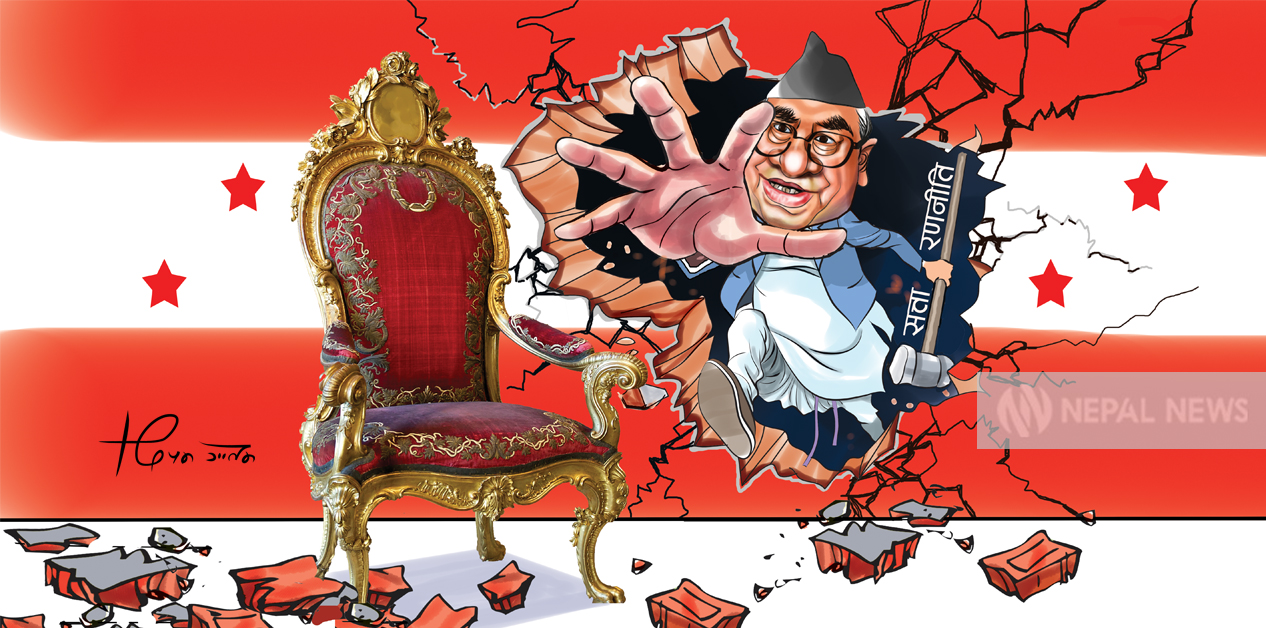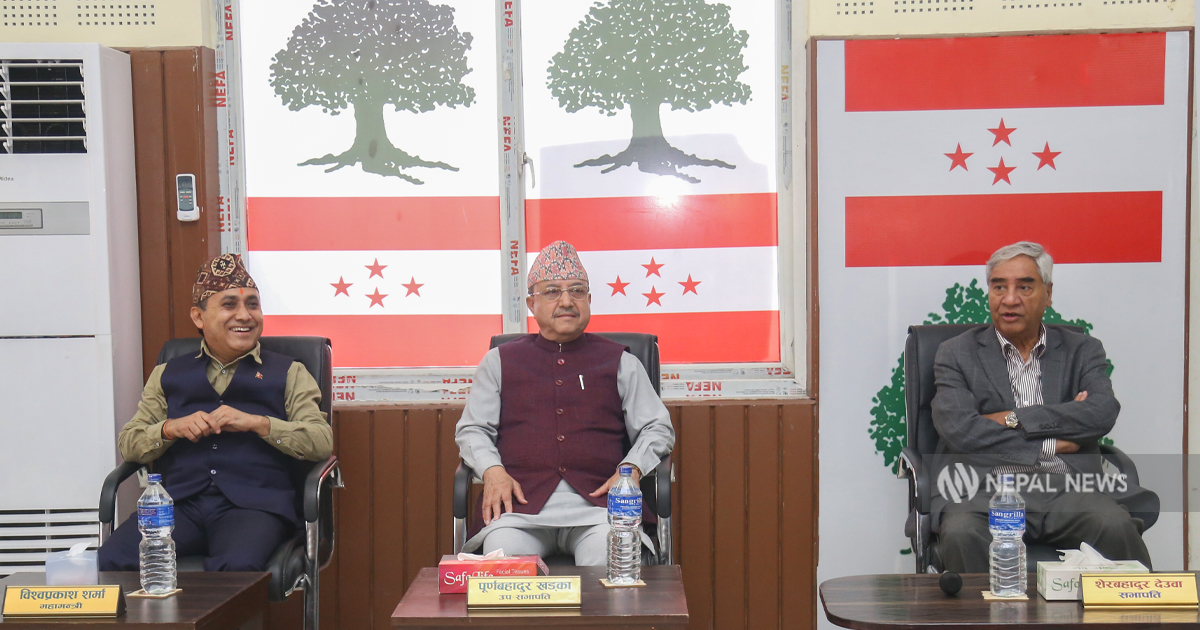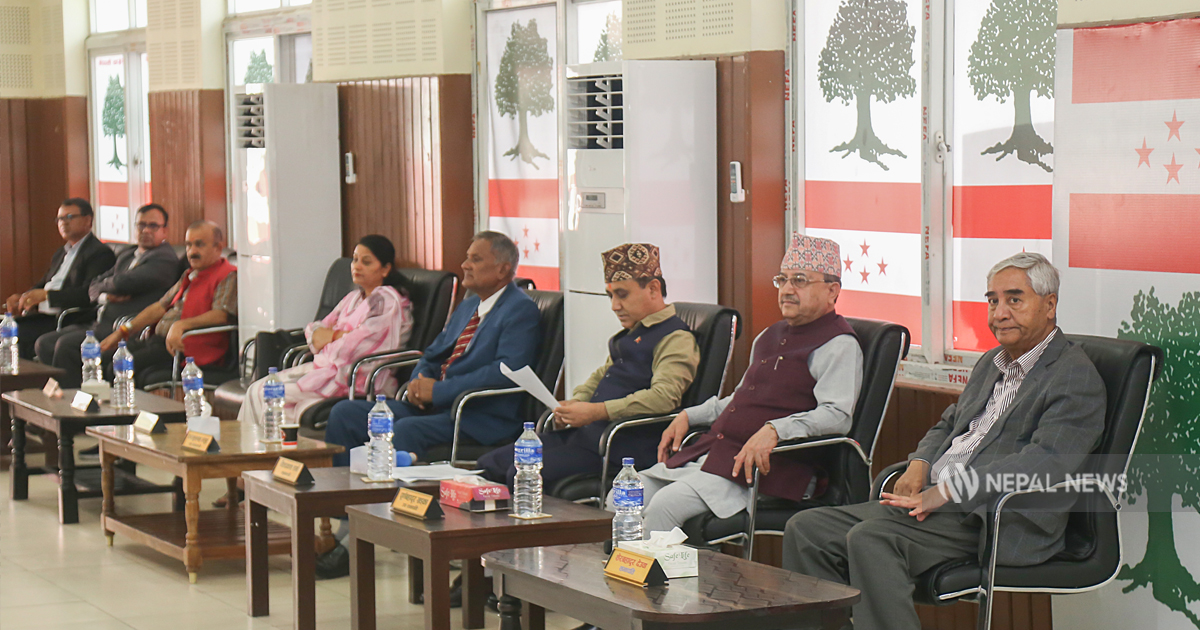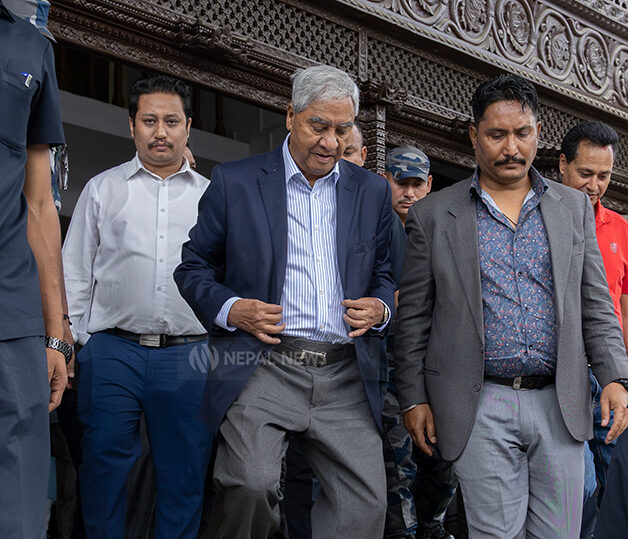
Political expediency erodes democratic legitimacy

KATHMANDU: Milan Chapagain, a voter from Jhapa Constituency-2, cast his vote for the Democratic-Left Alliance in the 2022 general election. Chapagain, who holds faith in the Nepali Congress, voted for the Congress’s electoral symbol in the Proportional Representation (PR) system, while giving his vote to the Maoist’s Hari Rana in the First Past the Post (FPTP).
The 30-year-old Chapagain, a final-year postgraduate student, thought that the Congress would become the largest party and form a government with the support of other alliance parties. Therefore, his role was not just limited to that of a voter; he also played an active role in the door-to-door campaign to make the Congress the largest party.
Indeed, the FPTP and PR votes given by voters like Chapagain made the Congress the largest party after the general election. The Democratic-Left Alliance included the Congress along with the Maoist Center, CPN (Unified Socialist), Loktantrik Samajbadi Party, and Janamorcha, among other parties. This Congress-led alliance had the majority to easily form a government. However, the Congress could neither lead the government nor take the initiative in forming a government.
Chapagain says, “There was an expectation that a government would be formed under the leadership of the Congress, bringing economic development, good governance, and employment opportunities to the country. But, contrary to that expectation, the electoral mandate itself was disregarded.”
Yashoda Baniya, a permanent resident of Ilam Constituency-1, had a similar experience to Chapagain. She also voted for the Congress-led alliance in the last election. Due to the alliance, she could not vote for the tree symbol in the FPTP, but she did vote for the tree in the PR system. She feels disappointed that the Congress, despite becoming the largest party through hard work in the election, could not form a government.
Yashoda says, “We wanted a government to be formed and to fulfill the needs of the citizens. But the party betrayed the public mandate. It followed the third party at times and the second party at others, frustrating the voters.”
These two representative voices belong to the 2,715,225 people who voted for the Nepali Congress in the 2022 general election. With few exceptions, the desire of most of those who voted for the Congress was for a government to be formed under Congress leadership.
In the general election of November 20, 2022, the Congress became the first party in the House of Representatives by winning 89 seats, while the UML became the second party by securing 78 seats. The Maoist Center and the Rastriya Swatantra Party won 32 and 21 seats, respectively, becoming the third and fourth parties. This was the first time since the 2013 Constituent Assembly election that Congress was successful in becoming the largest party in Parliament.
According to the results of the last general election, the key to power should have come into the hands of the Congress-led alliance. It would have been natural for a government under Congress leadership to be formed, with the participation of alliance partners like the Maoist Center, CPN (Unified Socialist), Loktantrik Samajbadi Party, and Janamorcha, in line with the public mandate. However, after the Congress failed to form a government under its own leadership, the game of power began to exploit the electoral mandate itself.
Sushil Bhatta, an active Congress Mahasamiti member from Kathmandu Constituency No. 7, says that despite making the party the largest in the election, the leadership’s indecision in forming a government is not natural. He says, “It is not natural for the leader of the first party in Parliament to wait for two and a half years for their turn to become Prime Minister.”
For the second and third forces in the House of Representatives, the UML and the Maoist Center, there was no difficulty in a swift power play. It was because of the Congress that the UML and the Maoist Center got the opportunity to lead the government.
For two and a half years after the election, the Congress has been limited to being a partner in coalition. Congress leader Bikash Lal Shrestha from Makwanpur complains that while the leadership keeps making mistakes and disregarding the public’s mandate, they are forced to stand by and watch. He says, “We have been forced to become worthless cadres, and because of worthless cadres, the Nepali Congress feels like it is on the verge of extinction.”
Generally, the party with a majority in Parliament forms the government. If no party can secure a clear majority, the first party runs the government. In the last election, it was the natural political responsibility of the Congress-led alliance to take the lead in forming a government. However, due to a weak strategy, the Congress is compelled to support the Maoist Center at times and the UML at other times.

Picture: Nepal News
Shankar Tiwari, an expert on Congress affairs, says that the party lost power because its “power-driven” President, Sher Bahadur Deuba, moved ahead alone. Tiwari says, “The party president always talks about what he likes and what he knows. He doesn’t bring the responsible members of the party forward, and then problems arise.”
Let’s look at the series of reverse steps and deviations by the Congress, which became the first party based on the public’s vote after the general election:
Deviation one: A meeting ground for Oli-Prachanda
The first deviation of the Congress was to lead an “unnatural alliance” in the election. In the last election, the Congress allied with parties whose ideologies did not align with its own. All other parties of the Democratic-Left Alliance besides the Congress were leftists.
The power alliance, which began with making Congress President Sher Bahadur Deuba the Prime Minister on July 13, 2021, culminated in the electoral alliance. Although the Congress-led alliance was technically successful in the election, the votes the Congress lost in the proportional representation system showed that the public did not like that arrangement.
The Congress-led alliance had the advantage of forming a majority government according to Article 76(2) of the Constitution. This was also the electoral mandate. But the Congress could not form a government despite being the largest party and having a majority with the Democratic-Left Alliance.
Due to the Congress’s confusion, a new government was formed on December 25, 2022, but under the leadership of Maoist Center Chairman Prachanda, the third party in Parliament. When the new government was formed according to the new public mandate, Sher Bahadur Deuba was still in the Prime Minister’s chair. Deuba’s goal was to become Prime Minister through consensus, with the support of the alliance partners after having fought the elections together at all three levels. Therefore, the Congress, with 88 seats, was prepared to continue in power.
After the election, Deuba failed to share power among the alliance partners for posts of government formation, President, Vice President, Speaker, Deputy Speaker, and provincial positions. This confusion caused Deuba to lose the opportunity to form a government. Tiwari says, “President Sher Bahadur Deuba could not uphold the mandate the public gave the electoral alliance to run the government. He could not negotiate according to the public’s will. That’s why the Congress lost the opportunity to form a government.”
The power-sharing tug-of-war that began between the two components of the Democratic-Left Alliance, the Nepali Congress and the Maoist Center, ended at noon on December 25, 2022. On that day, Maoist Chairman Pushpa Kamal Dahal ‘Prachanda’, who had taken a break for a meal from a meeting with Deuba at Baluwatar, went to Balkot and agreed to become Prime Minister with the support of UML Chairman KP Sharma Oli.
When the third force in Parliament, the Maoist Center, formed a government with the second force, the UML, the head of the first party, Deuba, was left stunned. His dream of becoming Prime Minister for the sixth time was not just shattered; the justification for the electoral mandate and the alliance ended on that very day.
Senior journalist Kishore Nepal says that with individualism thriving within the Congress, the party lost the key to power and influence. “There was a lack of a protector in the Congress. Sher Bahadur stopped taking advice from others as he used to. Individualism became dominant in the party. A monarch-ruler mentality started to emerge.”
The Oli-Prachanda relationship, which had been broken on July 13, 2021, was re-established because of Deuba. In the post-election power-sharing, UML Chairman Oli was strategically successful. He succeeded in making his close confidant Devaj Ghimire the Speaker.
The Rastriya Swatantra Party, the fourth party in Parliament, supported the UML-Maoist Center alliance, getting a significant share in the government, including the Deputy Speaker. The Congress, however, lost not only the government but also the Speaker and Deputy Speaker. This has also affected the Constitutional Council.
Senior Congress leader Dr Shekhar Koirala admits that the Congress failed to respect the public’s mandate. Koirala says, “The public voted for a government where the Maoist and other parties would unite under the leadership of the Congress. By creating a situation for a UML-Maoist government from the very beginning, the Congress-Maoist alliance betrayed the people.”
Deviation two: The trap to get into power

Picture: Nepal News
The Nepali Congress, which lost the opportunity to form a government on December 25, 2022, according to the electoral mandate, could not free itself from the lure of power. Just 16 days after being separated from power due to the Oli-Prachanda alliance, the Congress created a new game.
On January 10, 2023, by giving a vote of confidence to Prime Minister Prachanda without much thought, the Congress not only set a trap for power but also gave the leader of the third party with 32 seats an opportunity to get overwhelming support in Parliament. The Congress’s decision to give a vote of confidence to Prachanda made the Parliament devoid of a main opposition party. The Congress also became a government partner without being in the government, alongside the Maoist Center and the UML.
Following the third force, or the Maoist Center with 32 seats, was not honorable for the Congress according to the general election mandate. While the UML’s support made the Prime Minister’s chair easy for Prachanda, the Congress’s support made him the head of a government with the backing of almost all parties in the House of Representatives.
On January 10, 2023, Prachanda received 268 votes with the support of the Congress and the UML, as well as 10 other parties. In the 275-member House of Representatives, he had only 2 votes against him. On that day, 270 lawmakers participated in the voting process. This reverse step by the Congress allowed Maoist Chairman Prachanda to truly get a “Prachanda (overwhelming) vote.”
The Congress, which claims to be a proponent of parliamentary democracy, made a wrong precedent by making the house main opposition-free. On January 10, the Congress was accused of setting a trap to get into power by giving a vote of confidence to Prachanda.
Deviation three: Following the 32-seat party
The Nepali Congress, which set a trap by giving a vote of confidence to Prachanda, succeeded in getting a president in that trap. After following the Maoist Center, the Congress was successful in making Ram Chandra Paudel the head of state in the presidential election on February 25, 2023.
After the Communist Party of Nepal (Maoist Centre) decided to support the Nepali Congress in the presidential election, the UML was ousted from the government on March 9, 2023. Before the UML, the RSP and Rastriya Prajatantra Party, who had given a vote of confidence to Prachanda, had already left the government. After the presidential election, the Congress joined the government led by Prachanda, citing the electoral mandate. Congress ministers, led by Congress Vice President Purna Bahadur Khadka, took their oath on March 31, 2023.
Following the Maoist Center also helped the Nepali Congress increase its seats in the National Assembly election. In the election held on January 25, 2024, at least 10 people won from the Congress. All of them were elected with the votes of the alliance.
In the National Assembly election, too, the Nepali Congress, Maoist Center, CPN (Unified Socialist), JSP Nepal, and Rastriya Janamorcha had an electoral alliance. Political analyst Jainendra Jeevan says that the Congress has adopted a policy of not letting communist parties unite and making deals with them to get into power by any means. Jeevan says, “Because of the policy of cooperating with communists to get into power, the Congress is not becoming strong; it is becoming even weaker.”
Deviation four: The field is empty again
While following the third party brought the Congress benefits in power and power-sharing, it was difficult to maintain the Congress’s alliance with the Maoist Center. The Congress-Maoist Center alliance broke up after 10 months, and the Congress again provided a ground for the UML and the Maoist Center to unite. On March 4, 2024, after Prime Minister Prachanda removed the Congress from the government, the Congress again became powerless.
Deuba was angry with the Maoist Center over the fake Bhutanese refugee case. The then Prime Minister Prachanda was not happy with Finance Minister Prakash Sharan Mahat. Prime Minister Prachanda expressed dissatisfaction after Finance Minister Mahat blocked the cabinet’s decision to allocate Rs 200,000 each to the disqualified Maoist combatants identified by the United Nations Mission in Nepal (UNMIN) and to recognize an additional 2,938 individuals as martyrs, citing a lack of funds.
When Prachanda tried to remove the finance minister, Deuba stopped him. Similarly, Prachanda was also unhappy with the then-health minister, Mohan Basnet. Although Prachanda had promised to make Congress leader Krishna Prasad Sitaula, who had lost the House of Representatives election, the National Assembly Chairman and had him “illegally” enter the National Assembly, he was not made the National Assembly Chairman. Prachanda brought his brother Narayan Dahal as the National Assembly Chairperson.
After the growing bitterness with the Congress in the power alliance, Prachanda removed the Congress from the government on March 4. After that, a new power alliance of the UML, Maoist Center, RSP, and Janata Samajwadi Party (JSP) began.
By signing an eight-point written agreement, it was agreed that the Maoist Center would take the National Assembly chairmanship and the UML the vice-chairmanship, and the remaining time would be led by an alternating government.
When the second, third, and fourth forces were in the government, the first party in Parliament, the Congress, reached the status of the main opposition in Parliament. But the Congress continued to prioritize power over playing the role of the main opposition.
Political analyst Jainendra Jeevan adds, “The haste to get benefits by staying in power has thrived within the Congress since the past. I see this haste causing a major deviation in the Congress.”
Deviation five: A wrong precedent in parliamentary democracy
A few months after losing power, the Nepali Congress sat in the opposition. At that time, it continuously obstructed Parliament, claiming the involvement of then-Home Minister Rabi Lamichhane in the Supreme Savings and Credit Cooperative embezzlement.
The Congress’s struggle to form an investigation committee also bore results. After the committee was formed and a report was prepared, RSP President Rabi Lamichhane was put in judicial custody. His parliamentary post has been suspended.
This was another deviation of the Congress, creating an “unnatural” alliance in parliamentary politics and setting a worst-ever precedent in history.
However, the Congress did not remain in the opposition for long. Generally, in a parliamentary system, the first party runs the government and the second party sits in the opposition to hold the government accountable. If the first party fails, the second party forms the government and the first party sits as the main opposition.
Although this is not a written or mandatory system, it is the natural practice of a parliamentary system. Unfortunately, the Congress’s lust for power has reversed this natural practice, creating a wrong precedent.
While the UML-Maoist Center-RSP alliance government was running, at midnight on July 1, 2024, Congress President Sher Bahadur Deuba and his wife Arzu Rana Deuba took the initiative to create a situation that would stain the parliamentary system.
At a “businessman’s house” in the middle of the night, the Deuba couple created a reverse roadmap for a power-sharing arrangement between the Congress and the UML, who had been competing in the elections. The Deuba couple, along with their trusted people, including Ramesh Lekhak and Prakash Sharan Mahat, agreed to make UML Chairman KP Sharma Oli the Prime Minister overnight.
By agreeing to political stability, constitutional amendment, and leading the government for the remaining time on a half-and-half basis, the Congress was ready to follow the second force in Parliament, the UML.
This was another deviation of the Congress, creating an “unnatural” alliance in parliamentary politics and setting a worst-ever precedent in history.
Senior leader Shekhar Koirala, who had advocated for a Congress-UML alliance, has now started to feel that he advocated for the wrong thing. Koirala says, “I have realized that I made a mistake by advocating for a Congress-UML government. We are worried about this.”
Deviation six: Prime Minister’s chair in sight
Prime Minister KP Sharma Oli, while leaving a Parliament session on April 25, 2025, announced the date he would leave the government. Oli predicted that he would resign 14 months later and that Congress President Sher Bahadur Deuba would become Prime Minister. Oli’s statement came amid rumors of a government change.
On April 20, 2025, Congress President Sher Bahadur Deuba flew to Bangkok. Although Deuba flew abroad for medical treatment, after he returned to Nepal, discussions about a power-sharing change intensified.
Maoist Chairman Pushpa Kamal Dahal ‘Prachanda’ had also made a statement with a similar intent. To counter Prachanda’s statement, Oli claimed that he would hand over the Prime Minister’s post to Deuba 14 months later. Oli’s statement was, “I will resign after 14 months; Sher Bahadur Deuba will become Prime Minister.”
Oli’s statement has made Deuba happy. In joint meetings of Congress office-bearers and former officials, Deuba has signaled that the government will not change immediately. When asked about the government, President Deuba says that the government will change according to the agreement with the UML.
Deuba has not shown any intention of a government change even in party meetings and personal meetings with leaders. With Oli’s assurance, Deuba’s strategy is to become Prime Minister after one year.
On March 10, 2024, at the first convention of the party in Sudurpashchim Province, Deuba said, “He (KP Oli) has agreed to leave the Congress after two years. He has agreed to make me Prime Minister after that.”

Deviation seven: A forgotten promise
A 41-member committee led by General Secretary Bishwa Prakash Sharma took three months to write the manifesto for the last election. Then-Congress leaders (now RSP Vice President) Dr Swarnim Wagle, Congress leaders Dr Govind Pokharel, educationist Dr Krishna Prasad Paudel, political analyst and foreign affairs expert Geja Sharma Wagle, writer Shankar Tiwari, among others, prepared the Congress manifesto.
The Congress’s electoral slogan was “Protection of the Constitution, Stability, and the Basis for Prosperity, a Government under Nepali Congress Leadership.” The manifesto included ambitious plans such as a program from the womb to the grave, free health services for children under three and senior citizens above 73, and creating 1.25 million jobs over five years at a rate of 250,000 per year.
When asking for votes, the Congress announced that it would enact the remaining laws for the federal and provincial governments, abolish departments and public institutions that lacked utility, and free public institutions from party interference. By showing a manifesto that included some people-oriented programs, the Congress won 88 seats and became the first party in Parliament. However, the Congress could neither form a government according to its electoral promise nor show the initiative to fulfill it.
The head of the Congress’s publicity department, Min Bishwakarma, says that the Congress must answer to the people about the government’s failure. He says, “We have been widely accused of becoming the largest party in Parliament but always acting as a supporter of others. We must be ready to answer for that.”
The Congress did not spend much time trying to form a government under its own leadership; rather, it focused on how to get into power under the leadership of others. President Sher Bahadur Deuba’s strategy, who is considered a clever player in power politics, has appeared to be very weak this time. The result is that the Congress has been limited to being a crutch for others to reach power. Senior Congress leader Shekhar Koirala says, “I do not say that everything would have been fine if we were in power. But, if a government had been formed under the Congress’s leadership, there would not have been so much frustration and anarchy.”
According to the electoral mandate, a government should have been formed under the leadership of the Congress, the first party in Parliament, and this is what the Congress leaders themselves believe. If Sher Bahadur Deuba wants, a government can be formed under Congress leadership. The efforts of the Maoist Center, CPN (Unified Socialist), and other parties are focused on forming a government under Deuba’s leadership. However, Deuba does not seem ready to form a government under his own leadership immediately.
The Nepali Congress has missed the opportunity to refute the accusation that it has always been a supporter. Professor Govinda Pokharel, a central committee member of the Nepali Congress, says, “Our objective should be to create a correct and good precedent in parliamentary politics. The leadership must take responsibility for its failure in power strategy until now.”
The Nepali Congress has failed in the initiative to form a government under its own leadership. Deuba still has a psychological fear that Oli and Prachanda will unite. Former Nepali Congress General Secretary Shashank Koirala also says that with Deuba’s current behavior, the possibility of the Congress reaching the leadership of power is low.
Koirala adds, “I think the situation will continue this way as long as Sher Bahadur Deuba remains the Party President. Because this is his final period. Then a new leadership will give a new direction to the Nepali Congress.”